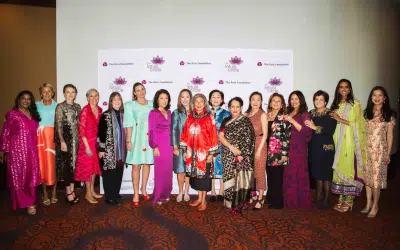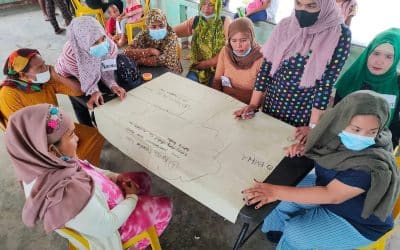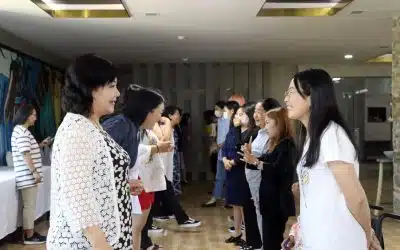InAsia
Insights and Analysis
Stories for Children of the Ocean
October 13, 2021
We all had a busy week last month as The Asia Foundation held the first-ever BookLab in the Pacific Islands, on the island nation of Fiji. Ten local artists—six writers and four illustrators—collaborated to write and illustrate 10 new storybooks for children. The theme was Oceans and Inclusive Climate Action—entirely appropriate for a region with the world’s largest ocean, facing the storm front of climate change.
The artists who joined the project were a multigenerational, multiethnic, and multigender group and included two people with disabilities. We forged two new partnerships: the Oceania Centre for Arts, Culture, and Pacific Studies of the University of the South Pacific (USP) helped to identify these aspiring writers, and the Fiji Association of the Deaf provided interpretation services for one of the illustrators.
The young authors gave considerable thought to their prospective readers: how to make a child laugh, what words to use and how to use them, and, of course, the importance of illustrations, which cannot be overstated. All were eager for the challenge of writing for kids, and by the end of the four-day collaboration they had composed 10 stories, whose main characters ranged from a disposable mask (we are still in the Covid era) and its adventures in the ocean, illustrating how trash travels, to a young boy encouraging his grandfather to move to a new house to escape sea-level rise, in a story called “Sea Change.”
“Sea Change” is the writer’s personal tribute to her late father-in-law, whom she remembers with much fondness despite their vastly different cultural backgrounds. Her young son inspired Maku, the main character in “Sea Change,” and the grandfather, Tutu, is drawn from her father-in-law. One of the things the author most vividly recalls about her father-in-law, she said, was his big hands. “Maku reached out and gently took Tutu’s big hand,” reads the tale.

The team for Fiji’s first-ever BookLab, September 2021 (photo: The Asia Foundation)
Another story, “The Great Council of Fish” explores upwelling in the sea and the consequences of warm ocean currents. The title will resonate with Fijian readers familiar with traditional leadership bodies. In the story, the Great Council of Fish convenes to discuss the problem of food shortage in the ocean, much as the Great Council of Chiefs would convene to discuss issues pertaining to the indigenous Fijians, the iTaukei.
The artists came to the BookLab from widely diverse backgrounds. Ropate Kama, a former wedding photographer, served as the project’s art director:
Illustrating children’s books that are “Fiji specific” has been a lifelong dream of mine, so when I was asked by the Foundation if I would be interested in illustrating four books and taking on the role of art director I was all in from the start. So far, it has met all my expectations and more.
Although Kama anticipated that the greatest challenge would be taking on all four books, he says:
It has actually been the new experience of working with someone with disabilities, as this has really broadened my understanding of how vital communication is, especially when having to relate to someone who is deaf and mute, not just to be able to communicate the story, vision, and characters but also to ensure that they understand the administrative side of things like deliverables and meeting the expectations of the organization. To be able to produce stories and illustrations for generations to come while picking up other new and vital skills in today’s world is a welcome opportunity, and I am so thrilled to be a part of such an amazing project.
One writer, Susie Elliott, who grew up in Fiji but lived in New Zealand for many years before deciding to return home , reflected:
I took up the challenge to write because I love picture books and because there is an awful need in our country to fill this niche in our literature. But most importantly, for myself, I want to write for the child in me, who came from this place, but whose early reading experiences in 1960s Fiji were books that spoke about a world in which I was nowhere present. In writing for the child in me, I hope to reflect something about self and place and a particular worldview.
The books are being translated into the two main vernacular languages, iTaukei and Fiji Hindi, and audiobooks will be produced for the vision impaired. Although English is Fiji’s official language due to the country’s colonial past, the two main ethnic groups in Fiji speak their own languages every day. Unfortunately, Fiji still struggles to effectively incorporate mother tongues into the education system, and literacy rates have been on the decline in recent years. One goal of the project is to reverse this trend of illiteracy, in both English and native vernaculars.

The island nation of Fiji (photo: Jon-Eric Melsæter, Oslo, Norway / CC BY 2.0, via Wikimedia Commons)
Just as language is part of the cultural identity of Fijian children, so is the physical environment that will shape their lives and livelihoods. Fiji is a Pacific archipelago with about 110 permanently inhabited islands. The new books both celebrate this oceanic world and warn of the threat posed by severe climate events—events like powerful storms and flooding with which Fijians are increasingly familiar.
To see their own lives reflected in these books and to read them in their mother tongues is part of being culturally visible in a world where people from small island states often feel invisible. All of us in the BookLab hope that these 10 original stories, in the three main languages of Fiji, will awaken a passion for reading in primary school children and perhaps give birth to a new generation of writers and illustrators who will tell their nation’s tales.
Milika Sobey is The Asia Foundation’s program manager in the Pacific Islands. She can be reached at [email protected]. The views and opinions expressed here are those of the author, not those of The Asia Foundation.
4 Comments
About our blog, InAsia
InAsia is posted and distributed every other Wednesday evening, Pacific Time. If you have any questions, please send an email to [email protected].
Contact
For questions about InAsia, or for our cross-post and re-use policy, please send an email to [email protected].The Asia Foundation
465 California St., 9th Floor
San Francisco, CA 94104
The Latest Across Asia
News
April 25, 2024
Program Snapshot
April 18, 2024
News
April 17, 2024

2024 Lotus Leadership Awards
The Lotus Leadership Awards recognize contributions towards gender equality in Asia and the Pacific







What an awesome project! Can’t wait to introduce the Fijian children in my home to the ten new books!
wonderful achievement for mana of the writers and those who will read/hear them.
thanks for this information any leads on when the titles will be available for purchase and how?
You might wish to email the authors using the addresses at the end of the article.